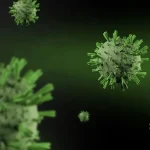As Poslovni Dnevnik writes, the entire world has been in engulfed in the coronavirus pandemic for a full year now. 120 million people became infected globally, and tragically, more than 2 million and 600 thousand of those people died. Numerous epidemiological restrictions have been introduced that do not allow for the life to which we´re accustomed – people are tired.
The long-awaited coronavirus vaccines that evoke hope have been created and are now being rolled out, but the spread of the novel infection hasn´t stopped. The situation here in Croatia, Slovenia, Bosnia and Herzegovina and Serbia was discussed on HRT.
Infectologist Dragan Delic called in from the Serbian capital of Belgrade.
“We weren´t ready, all the problems that arrived showed in their worst of forms. We´re now suffering the consequences of some misconceptions that exist,¨ he told HRT.
“The solutions that were implemented weren´t an enjoyable thing to do. It was not the most enjoyable thing to have to do, to have to form Crisis Staff. It’s some weird body made up of doctors, health professionals, economists… Some compromises always need to be made, but there can be no compromise when it comes to medicine and science,¨ Delic said of the situation in Serbia, adding that it was inappropriate for doctors to have to weigh things up between public health and economic consequences.
“There are too many compromises being made, I cannot justify for medical reasons to be suppressed because of something else,” Delic said. He noted that the problem is that citizens don´t trust the Crisis Staff, which has not always made the best decisions.
“The dominant variants will be those which are the easiest to cope with if infected, but the virus will be able to spread more easily”
“The virus is going to remain with us, it isn´t going anywhere, and it will try to find a balance. The more easy variants will be the dominant one, but the virus will spread more easily. We have no choice in this, we will become sick. The only question is what the consequences of that infection will be,¨ said Delic at the end, emphasising the importance of the vaccine.
Academician Mirsada Hukic, specialist in microbiology and subspecialist virology, reported from Sarajevo. She said that everything about the pandemic in Bosnia and Herzegovina is complicated because there is no common approach.
“The situation is very worrying,” said Hukic. She added that there is no one institution that deals with the pandemic, so the situation continues to be very confusing.
In neighbouring Bosnia and Herzegovina, 12 mutations of the novel coronavirus have now been isolated, three of which have become dominant, said Hukic.
Vice-dean of the Medical Faculty in Ljubljana, the head of the Institute of Microbiology and Immunology, Miroslav Petrovec, said that curfew is not popular in Slovenia, but that the movement of people at night should be reduced.
“We have a weekly average of 707 newly infected people, which is not good. We´re the most worried about the new strains of the virus,¨ added Petrovec.
The director of the Clinic for Infectious Diseases here in Zagreb, Prof Alemka Markotic, said that the appearance of mutated strains of the virus has indeed further complicated the situation.
“The British strain has taken over Europe, but it is entering a phase of slower spread now. The South African strain has not yet been detected in all countries, nor has the Brazilian one,” explained Prof Alemka Markotic.
“A series of vaccines blocked by other countries did not arrive in Croatia”
The director of KB Dubrava, Ivica Luksic, said that the coronavirus pandemic brought a number of weaknesses up to the surface, but also a few good things. He praised the Ministry and the members of Croatia´s National Civil Protection Headquarters for their diligent work.
“Today, the organisation within hospitals is better, it is now much easier to adapt to the increase in the number of coronavirus patients. Today we´re more equipped and we have a lot of experience underour belts,¨ he said.
Prof Alemka Markotic commented on the situation with the AstraZeneca vaccine, which has faced many questions due to some reported side effects.
“It is common for side effects to occur after receiving a vaccination. What is known so far is that one death and one embolism which occured in Austria are not related to the vaccine. You have batches or a series in every production line, it is normal if there is some suspicion about one batch that you stop vaccinating with that batch,¨ she explained.
Prof Alemka Markotic also added that the series that was temporarily blocked by other countries does not exist in Croatia because it never arrived here.
The facilitator asked academician Hukic which vaccine she would prefer. “The best one is the whuch is available, at least to us in Bosnia and Herzegovina,” said Hukic.
“They are trying to find new drugs, a lot of steps forward have been made. It will serve not only against the novel coronavirus but also against other diseases. We have good experiences with corticosteroids, as well as with plasma, which is now being given at an earlier stage,¨ said Prof Alemka Markotic when asked what drugs are used to treat serious coronavirus patients here in Croatia.
Hukic stated her view in that she is against the introduction of Covid passports. Petrovec disagreed, he advocates the introduction of such passports for vaccinated individuals. Prof Alemka Markotic said that the reality is that there will be certificates of vaccination and coronavirus testing, but that she believes that it will not be discriminatory.
For the latest travel info, bookmark our main travel info article, which is updated daily.
Read the Croatian Travel Update in your language – now available in 24 languages.
Join the Total Croatia Travel INFO Viber community.











